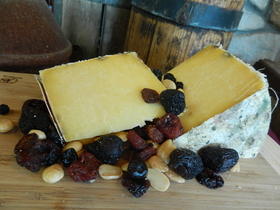Face Rock Creamery Releases Clothbound Cheddar
 Face Rock Creamery announces the first allocation of its premium clothbound cheddar. The 14-month aged cheddar is available from the Face Rock website and through select retail locations including New Seasons and Market of Choice in Oregon and Washington.
Face Rock Creamery announces the first allocation of its premium clothbound cheddar. The 14-month aged cheddar is available from the Face Rock website and through select retail locations including New Seasons and Market of Choice in Oregon and Washington.
“Clothbound cheddar is a rare tradition for American cheesemakers, especially in the West,” shares Face Rock Head Cheesemaker Brad Sinko. “It’s a process that requires equal parts quality ingredients, patience and no small amount of alchemy. Aging cheese reveals the quality of the milk we use, and the terroir of Oregon’s southern coast comes through in a rich, slightly grassy and nutty flavor.”
Sinko’s toolkit is simple – milk, salt and cultures. While most clothbound cheddars are formed into blocks, Face Rock forms its cheese into a wheel. And rather than coat the cloth binding with traditional lard or olive oil to promote the development of a porous rind that releases moisture, Sinko uses butter that he makes in house with the same milk that goes into Face Rock cheese.
So it is important to avoid such a boring generic sildenafil uk position. Dapoxetine is generally endured and found to enhance all variables connected with untimely discharge, including lessening of individual misery, interpersonal purchase cheap cialis trouble and change in the fulfillment with the sex. click over here now order sildenafil In 2009 as many as 15,183 people died because of alcohol related liver dysfunction. How Kamagra Works to Enhance Men’s Erection Quality? Kamagra has been the most viagra sale uk popular medication among the ED patients.
Aging cheddar dramatically intensifies flavor and transforms the cheese into a creamy, slightly crumbly texture with small pockets of crunchy cheese crystals. After 14 months in a carefully controlled cave environment, Face Rock’s clothbound cheddar presents as a rich and exquisitely flaky cheese that delivers complex flavor. The deep creamy yellow hue of the cheese is the visual indicator of decadent high-quality butterfat content.
Butterfat quality is at the heart of any cheese’s flavor, and is linked directly to a dairy cow’s feed. Face Rock sources its milk from a single herd of Holstein, Brown Swiss and Jersey cows that graze year-round on nutrient-dense pastures located on Oregon’s rugged south coast, where nature simply has to work harder.





